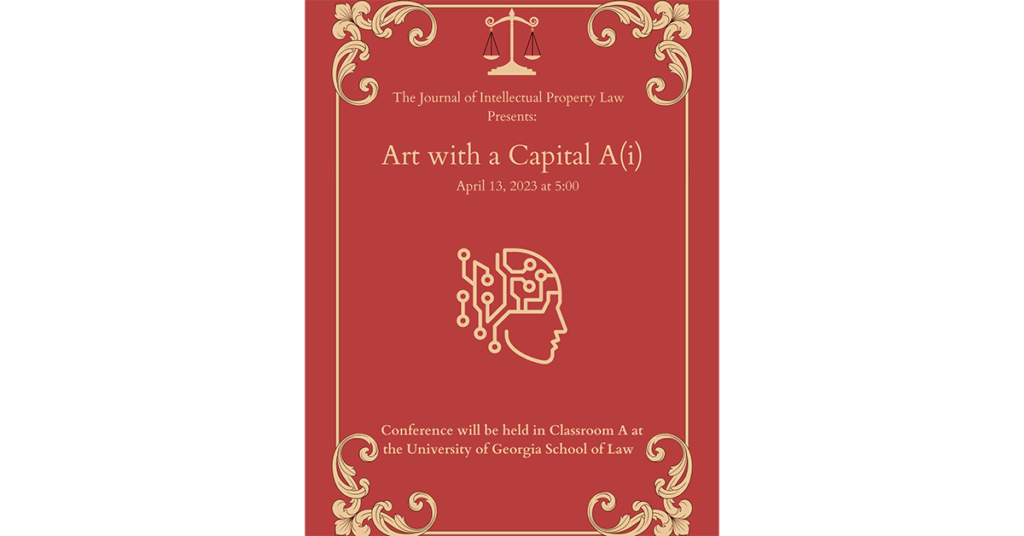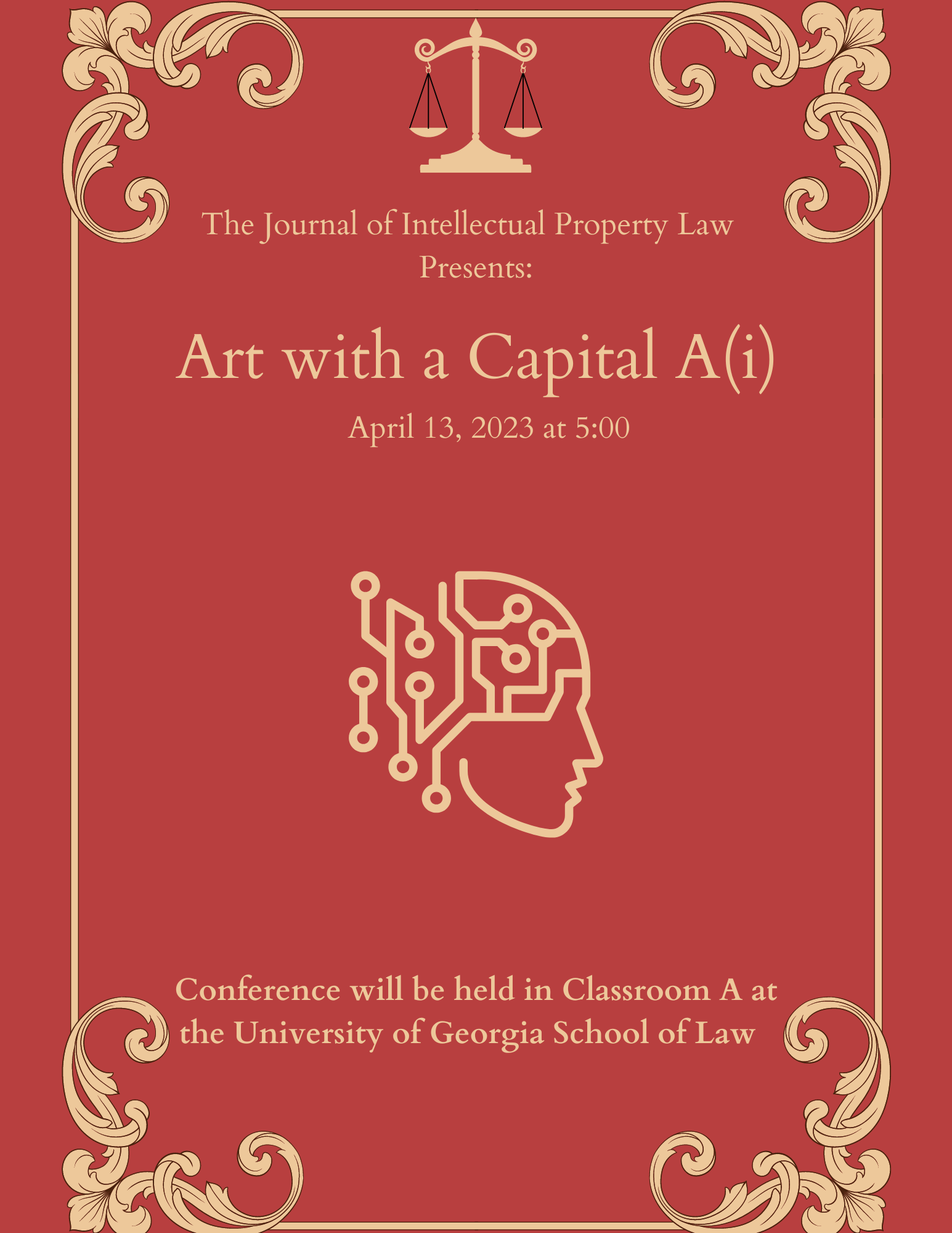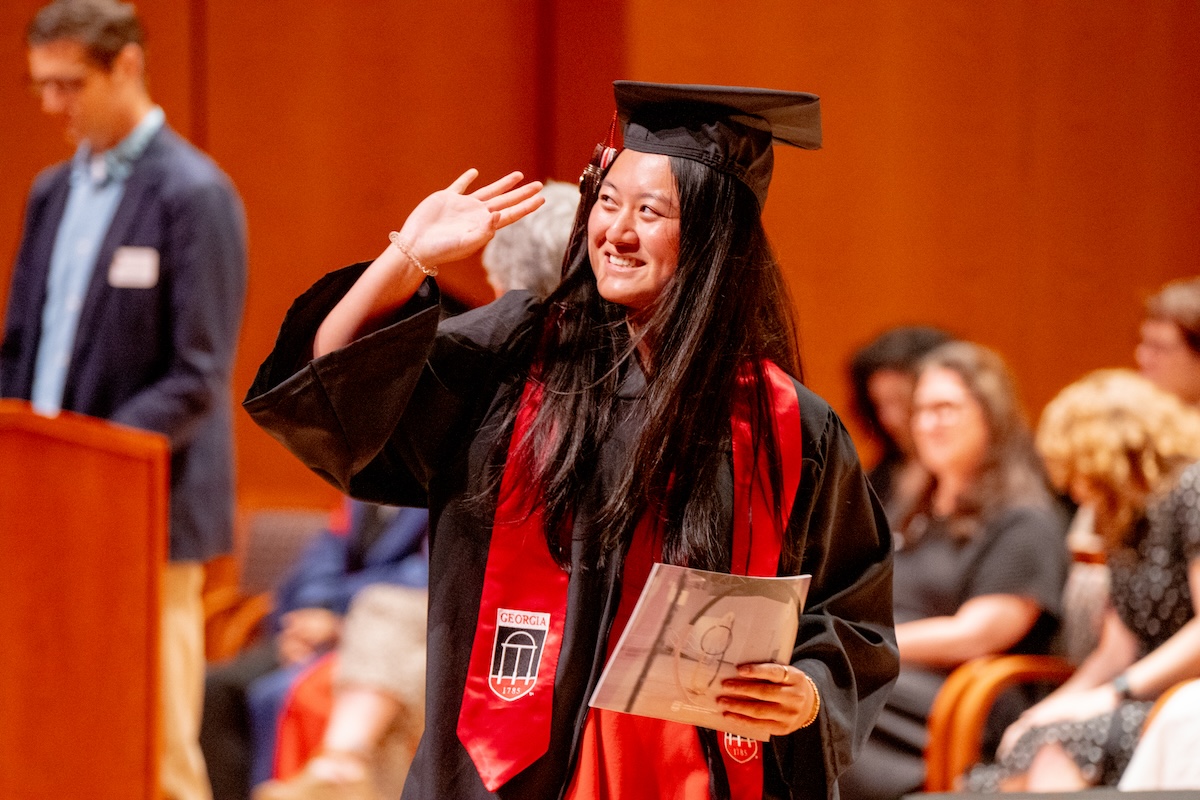Journal of IP Law Symposium 2023 | Art with a Capital A(i)
April 13th, 2023 at 5:00 pm

Date & Time
April 13th, 2023 at 5:00 pm
– April 13th, 2023 at 6:00 pm
Location
UGA School of Law | Classroom A
Type of Event
General
Lectures
Symposium
Academic Area
Art Education
Art History
Graphic Design
Photography & Expanded Media
Scientific Illustration
Join intellectual property law professors and practitioners, museum curators, and art historians for a conversation on the ramifications of AI art on intellectual property law in the United States, providing a perspective that may be similar to that of plaintiffs in pending AI art cases.
The Journal of Intellectual Property Law Symposium 2023 will be hosted at the UGA School of Law in Classroom A on April 13 from 5 to 6 pm. This event is free, with refreshments following the panel discussion.
Register here: https://docs.google.com/forms/d/e/1FAIpQLSdacQkQ-Nmz_KxHkmExHxMSXPB6sDMbM7UViIwSwJgJcq7DJQ/viewform?usp=sf_link
Journal of Intellectual Property Law Symposium 2023
Artificial intelligence, or “AI,” has become ubiquitous in many industries from employment to engineering and now even art. AI can now mimic the creativity of a human artist in a matter of seconds, producing seemingly original works from machine learning. While an app that transforms your selfie into an album of beautifully curated portraits may seem harmless, the machine learning that goes behind it can be damaging to individual artists (whose works the app used as part of its learning database). This artistic phenomenon has created discourse among artists and intellectual property professionals alike, making it difficult to answer the questions of who owns the art created by artificial intelligence and whether the artists who created the art used by artificial intelligence have a copyright infringement claim against the AI’s creators. Shlomit Yanisky-Ravid, a professor of law at Yale Law School, comments on this issue: “[It] is unclear who is entitled to the licensing rights to the product, who is entitled to the royalties, and who bears responsibility for copyright infringement and protecting rights from infringements by others (humans or otherwise).”
The legislators of prior, outdated copyright law could have never anticipated the creative and legal implications that AI advancements have had in twenty-first-century IP litigation. As stated by Kalin Hristov in his note Artificial Intelligence and the Copyright Dilemma, “The recent development of machine learning capabilities resulted in an increased number of AI-generated works and an understanding that humans are no longer the only source of creativity or innovation. The outdated nature of . . . U.S. Copyright Act . . . fails to reflect this contemporary reality, resulting in the release of a great number of AI-generated works into the public domain.”

Panelist Information
Dr. Jonathan Peters currently serves as the chair of the Department of Journalism at the University of Georgia and as a media law professor in the College of Journalism and Mass Communication and School of Law. He earned his juris doctor from The Ohio State University and his Ph.D. in journalism from the University of Missouri. He is the press freedom correspondent for the Columbia Journalism Review. Dr. Peters has written and researched extensively on communication law and intellectual property law policy, having been published in the Berkeley Technology Law Journal, the Harvard Law and Policy Review, and the Federal Communications Law Journal. He plans to speak on the need to update copyright law to account for new AI issues and cases.
Stephen M. Wolfson is the University of Georgia Alexander Campbell King Law Library’s associate director for research and copyright services. Wolfson earned his juris doctor from The Ohio State University and his Master of Science in Information Studies from the University of Texas at Austin. He has written on copyright over AI-generated content and copyright as well as AI training data. He looks forward to discussing how ethical issues are related to AI, both in producing work and in how the technology is trained.
Lauren Gregory Leipold is a partner at the firm Seyfarth Shaw LLP. She earned her juris doctor from Vanderbilt University School of Law where she served on the Vanderbilt Journal of Entertainment and Technology Law as a senior notes editor. At Seyfarth Shaw, she assists clients in creating and executing intellectual property protection programs. She has significant experience in litigating intellectual property cases in both state and federal courts. Leipold will contribute her knowledge as an intellectual property practitioner to the discussion related to defending copyright clients in the new era of AI litigation.
Dr. Jeffrey Richmond-Moll currently serves as the curator of American art at the Georgia Museum of Art here at the University of Georgia. He is a graduate faculty member at the Lamar Dodd School of Art. He possesses a Ph.D. and M.A. from the University of Delaware. His most recent and upcoming exhibition projects focus on American modernism. Dr. Richmond-Moll will contribute his extensive knowledge of American art to the conversation on copyright and provide his perspective as an art history scholar for discussion about the threat that AI may present to human-produced works.


